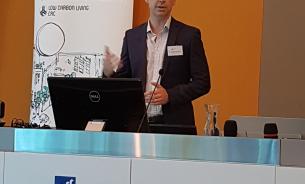This project aims to develop a shared platform for integrated energy, transport, waste and water (ETWW) demand forecasting and scenario planning, focusing on gaps, synergies, alternative approaches and required research directions. It will include a series of facilitated national workshops on demand forecasting for ETWW utilities and services and on scenario generation and appraisal. The aim is to seek the development of integrated tools for ETWW demand forecasting and scenario evaluation, identifying commonalities in data requirements and model formulation.
You are here
RP2002: Integrated ETWW Demand Forecasting and Scenario Planning for Precincts
Publications related to this project
Knowledge of real-world greenhouse gas emission rates for traffic is necessary for forecasting transport greenhouse gas emissions. This paper presents greenhouse gas emission rates that assist forecasting and modelling greenhouse gas emissions from light vehicles, i.e. private passenger vehicles...
Waste is a symbol of inefficiency in modern society and represents misallocated resources. This paper outlines an on-going interdisciplinary research project entitled ― Integrated ETWW demand forecasting and scenario planning for low-carbon precinct and reports on first findings and a literature...
The study aims to develop a demand forecasting tool called 'zero waste index' (ZWI) for measuring the natural resources recouped from municipal solid waste.
This details the outcomes of recent research efforts on the development of an integrated ETWW demand estimation tool with detailed scenario forecasting abilities. Read HERE
There are a number of factors accelerating the uptake of residential battery systems in Australia, these include: falling battery cost, increased energy prices and lower solar export rates. Given the new interest, it is important to analyse the optimal capacities of residential battery...
In the future there will be an increased uptake of solar and battery systems in the residential sector, driven by falling battery costs and increasing electricity tariffs. The increased uptake means we need new methods to forecast electricity demand when considering these technologies. This...
KEY POINTS
• Estimating and managing demand for energy, transport, waste and water services are critical components of sustainable urban development.
• We have produced a tool that can both forecast the demands of these services as well as their carbon impact as they interact and vary...
This research project has developed a tool for integrated demand and carbon impact forecasting of ETWW demand at the precinct level, which supports scenario planning for alternative precinct development plans.
Forecasting for integrated demands and carbon impacts of a precinct in the ETWW (energy, transport, waste and water) domains will allow for the assessment of policy scenarios for low carbon futures. This CRC for Low Carbon living project has investigated gaps, synergies, alternative...
Student Poster – Participants Annual Forum 2015 – He He
A concept framework capable of clarifying different components of municipal waste management
Student Poster – Participants Annual Forum 2015 – Steven Percy
Residential electricity demand forecasting with batteries
Forecasting for integrated demands and carbon impacts of a precinct in the ETWW (energy, transport, waste and water) domains will allow for the assessment of policy scenarios for low carbon futures. This CRC for Low Carbon living project has investigated gaps, synergies, alternative approaches...
The following report presents the outcomes of the third workshop associated with this project, held at the University of South Australia’s Mawson Lakes Campus, University Boulevard, Mawson Lakes, South Australia on Thursday the 15th of May 2014 at Room X1-03 at from 10:00am until 4:00pm. The...
The following report presents the outcomes of the second workshop held for this project held on Tuesday the 24th September 2013 at Room BJ3-03 at the University of South Australia‟s City East Campus, Corner North Tce & Frome Rd, Adelaide from 10:00am until 4:30pm. The focus of this workshop...
This is a summary of the workshop presentations, discussions and of the workgroup sessions for the CRCLCL’s project on Energy, Transport, Waste, Water (ETWW) conducted Friday 1st February 2013, 10:00 – 16:30 at Room C4-16 at the University of South Australia’s City East Campus,...
Research Snapshot A3 size poster from Participants Annual Forum 2014
Student Poster - Participants Annual Forum 2014, Steven Percy - Size A2
Electricity Load Forecasting for Low Carbon Communities
Student Poster - Participants Annual Forum 2014, Ivan Iankov - Size A2
Emission Rates of Vehicle Classes Applicable to the Australian Light Vehicle Fleet
Student Poster - Participants Annuan Forum 2014, He He - Size A2
ETWW Demand Forecasting
How a bridge connecting matematical models and human behaviours for municipal waste management should be built

